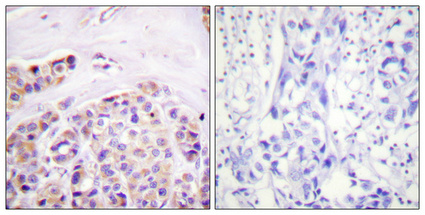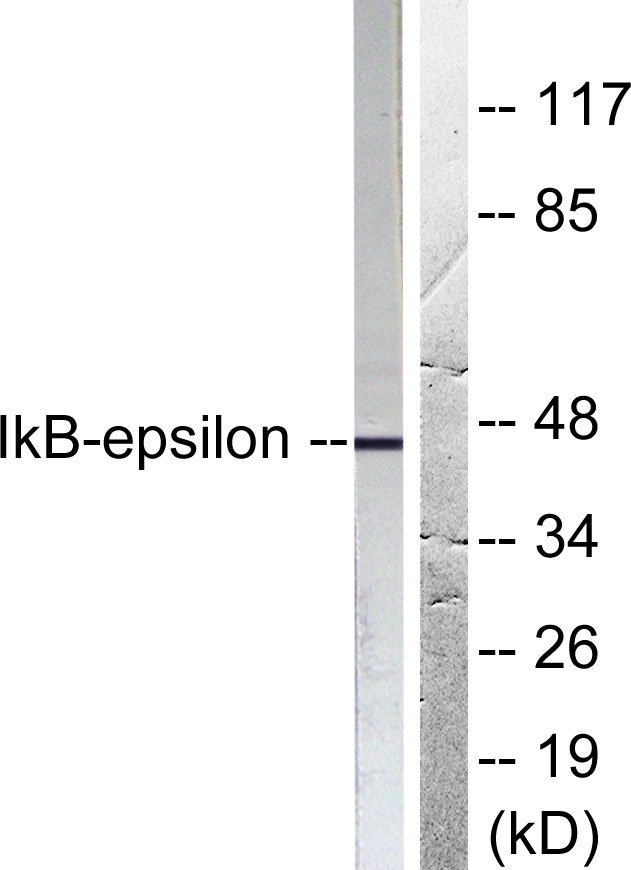IκB-ε Polyclonal Antibody
- Catalog No.:YT2422
- Applications:WB;IHC;IF;ELISA
- Reactivity:Human;Mouse;Rat
- Target:
- IκB-ε
- Fields:
- >>Th1 and Th2 cell differentiation;>>Th17 cell differentiation;>>T cell receptor signaling pathway;>>B cell receptor signaling pathway;>>Neurotrophin signaling pathway;>>Adipocytokine signaling pathway;>>Epstein-Barr virus infection;>>PD-L1 expression and PD-1 checkpoint pathway in cancer
- Gene Name:
- NFKBIE
- Protein Name:
- NF-kappa-B inhibitor epsilon
- Human Gene Id:
- 4794
- Human Swiss Prot No:
- O00221
- Mouse Gene Id:
- 18037
- Mouse Swiss Prot No:
- O54910
- Immunogen:
- The antiserum was produced against synthesized peptide derived from human IkappaB-epsilon. AA range:131-180
- Specificity:
- IκB-ε Polyclonal Antibody detects endogenous levels of IκB-ε protein.
- Formulation:
- Liquid in PBS containing 50% glycerol, 0.5% BSA and 0.02% sodium azide.
- Source:
- Polyclonal, Rabbit,IgG
- Dilution:
- WB 1:500 - 1:2000. IHC 1:100 - 1:300. IF 1:200 - 1:1000. ELISA: 1:40000. Not yet tested in other applications.
- Purification:
- The antibody was affinity-purified from rabbit antiserum by affinity-chromatography using epitope-specific immunogen.
- Concentration:
- 1 mg/ml
- Storage Stability:
- -15°C to -25°C/1 year(Do not lower than -25°C)
- Other Name:
- NFKBIE;IKBE;NF-kappa-B inhibitor epsilon;NF-kappa-BIE;I-kappa-B-epsilon;IkB-E;IkB-epsilon;IkappaBepsilon
- Observed Band(KD):
- 45kD
- Background:
- The protein encoded by this gene binds to components of NF-kappa-B, trapping the complex in the cytoplasm and preventing it from activating genes in the nucleus. Phosphorylation of the encoded protein targets it for destruction by the ubiquitin pathway, which activates NF-kappa-B by making it available to translocate to the nucleus. [provided by RefSeq, Sep 2011],
- Function:
- function:Inhibits NF-kappa-B by complexing with and trapping it in the cytoplasm. Inhibits DNA-binding of NF-kappa-B p50-p65 and p50-c-Rel complexes.,PTM:Serine phosphorylated; followed by proteasome-dependent degradation.,similarity:Belongs to the NF-kappa-B inhibitor family.,similarity:Contains 6 ANK repeats.,subunit:Interacts with RELA, REL, NFKB1 nuclear factor NF-kappa-B p50 subunit and NFKB2 nuclear factor NF-kappa-B p52 subunit.,tissue specificity:Highly expressed in spleen, testis and lung, followed by kidney, pancreas, heart, placenta and brain. Also expressed in granulocytes and macrophages.,
- Subcellular Location:
- Cytoplasm .
- Expression:
- Highly expressed in spleen, testis and lung, followed by kidney, pancreas, heart, placenta and brain. Also expressed in granulocytes and macrophages.
- June 19-2018
- WESTERN IMMUNOBLOTTING PROTOCOL
- June 19-2018
- IMMUNOHISTOCHEMISTRY-PARAFFIN PROTOCOL
- June 19-2018
- IMMUNOFLUORESCENCE PROTOCOL
- September 08-2020
- FLOW-CYTOMEYRT-PROTOCOL
- May 20-2022
- Cell-Based ELISA│解您多样本WB检测之困扰
- July 13-2018
- CELL-BASED-ELISA-PROTOCOL-FOR-ACETYL-PROTEIN
- July 13-2018
- CELL-BASED-ELISA-PROTOCOL-FOR-PHOSPHO-PROTEIN
- July 13-2018
- Antibody-FAQs
- Products Images

- Immunohistochemical analysis of paraffin-embedded Human breast cancer. Antibody was diluted at 1:100(4° overnight). High-pressure and temperature Tris-EDTA,pH8.0 was used for antigen retrieval. Negetive contrl (right) obtaned from antibody was pre-absorbed by immunogen peptide.

- Immunofluorescence analysis of HeLa cells, using IkappaB-epsilon Antibody. The picture on the right is blocked with the synthesized peptide.

- Immunohistochemistry analysis of paraffin-embedded human breast carcinoma tissue, using IkappaB-epsilon Antibody. The picture on the right is blocked with the synthesized peptide.

- Western blot analysis of lysates from HeLa cells, treated with TNF-a 20ng/ml 5', using IkappaB-epsilon Antibody. The lane on the right is blocked with the synthesized peptide.



